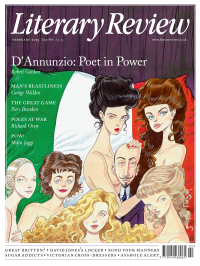Piers Brendon
Baiting the Tigers
Return of a King: The Battle for Afghanistan
By William Dalrymple
Bloomsbury 567pp £25
As William Dalrymple shows in this definitive study, Britain’s first invasion of Afghanistan in 1839 bore marked resemblances to the war currently being waged in that unforgiving land. Then as now, the conflict was based on ‘doctored intelligence about a virtually non-existent threat’. Getting into Afghanistan was relatively easy but the infidel occupation provoked a fierce resistance that made getting out hideously problematic. The same tribal rivalries and alien stupidities bedevilled the campaign. Atrocities occurred on both sides and the cost in blood and treasure was inconceivably greater than any benefit that the invaders might have gained. When the present British forces withdraw, David Cameron will undoubtedly proclaim victory, as the governor-general of India did in 1842. But, Dalrymple observes, the Herat Museum that displays the detritus of other abortive attempts to subjugate Afghanistan, ranging from Victorian cannon to Soviet helicopter gunships, will undoubtedly be able to add shot-up American Humvees and British Land Rovers to its collection.
Of course, as Dalrymple acknowledges, history does not repeat itself exactly. The first British assault on Afghanistan was unique in important respects, not least in being the opening gambit in the Great Game against Russia – the Lion’s century-long struggle to secure India’s northwest frontier against the Bear. It is

Sign Up to our newsletter
Receive free articles, highlights from the archive, news, details of prizes, and much more.@Lit_Review
Follow Literary Review on Twitter
Twitter Feed
It wasn’t until 1825 that Pepys’s diary became available for the first time. How it was eventually decrypted and published is a story of subterfuge and duplicity.
Kate Loveman tells the tale.
Kate Loveman - Publishing Pepys
Kate Loveman: Publishing Pepys
literaryreview.co.uk
Arthur Christopher Benson was a pillar of the Edwardian establishment. He was supremely well connected. As his newly published diaries reveal, he was also riotously indiscreet.
Piers Brendon compares Benson’s journals to others from the 20th century.
Piers Brendon - Land of Dopes & Tories
Piers Brendon: Land of Dopes & Tories - The Benson Diaries: Selections from the Diary of Arthur Christopher Benson by Eamon Duffy & Ronald Hyam (edd)
literaryreview.co.uk
Of the siblings Gwen and Augustus John, it is Augustus who has commanded most attention from collectors and connoisseurs.
Was he really the finer artist, asks Tanya Harrod, or is it time Gwen emerged from her brother’s shadow?
Tanya Harrod - Cut from the Same Canvas
Tanya Harrod: Cut from the Same Canvas - Artists, Siblings, Visionaries: The Lives and Loves of Gwen and Augustus John by Judith Mackrell
literaryreview.co.uk